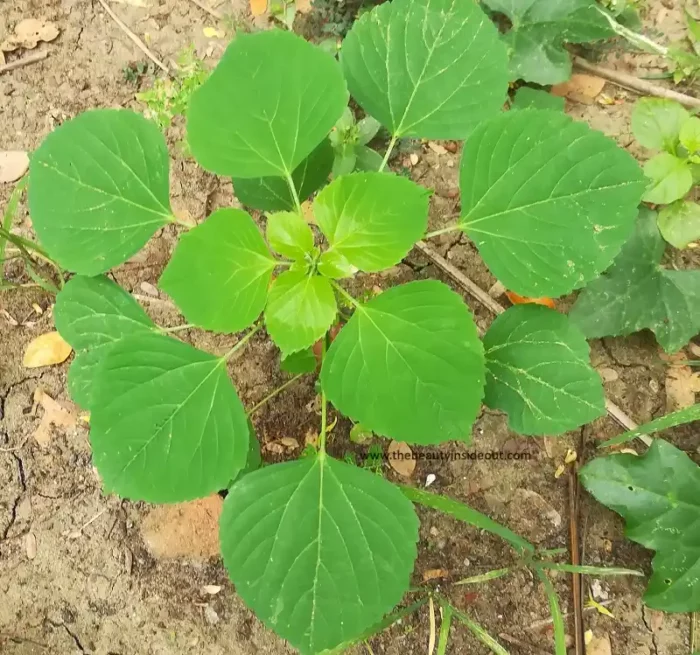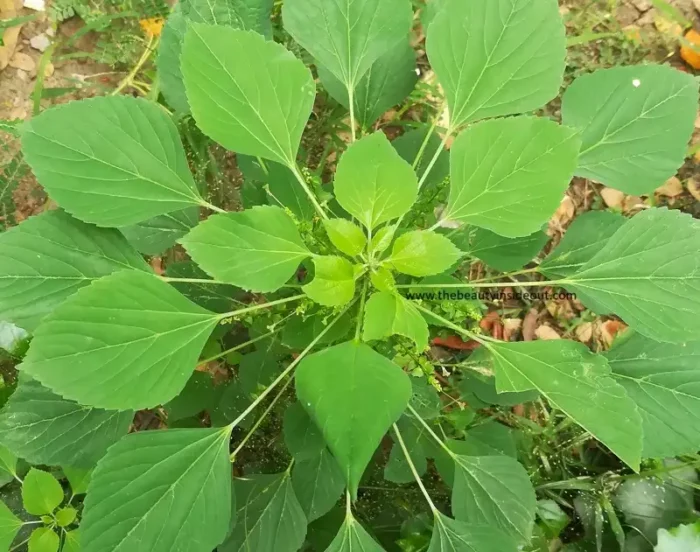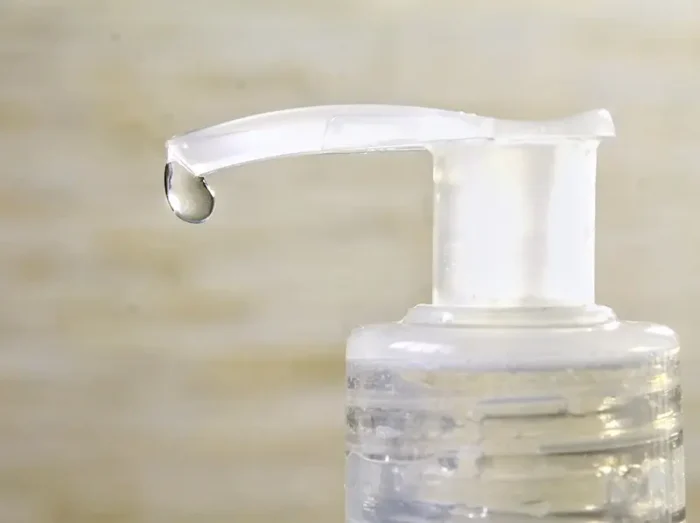Ayurveda is a treasure trove of remedies. These traditional medicines are often safe and easy to find. Ayurvedic treatments were often made with widely available plants and herbs, making them simple and convenient to prepare. And we came upon one of these plants today.
Table of Contents
Kuppaimeni Botanical Name in English
kuppaimeni is called Acalypha Indica in English. It is also called Indian Nettle and Indian Catnip – because cats appear to like the plant much like they do catnip.
Kuppaimeni Common Names
Tamil Name: குப்பைமேனி / Kuppaimeni
Hindi Name: खोकली / Khokali
Malayalam Name: കുപ്പമേനി / Kuppaimeni
Telugu Name: కుప్పింతకు /kuppintaku
Kannada Name: ಕುಪ್ಪಿಗಿಡ/Kuppigida
Marathi Name: Khajoti
What is Kuppaimeni Used For?
Kuppaimeni or Acalypha Indica (its scientific name) is widely utilized for health benefits and to treat diseases in Southern India, especially Tamil Nadu and parts of Africa. Not only that, but it also offers certain aesthetic benefits. For example, it aids in the removal of facial hair. It will soften your hair at first, then make them extremely easy to remove with frequent usage. It also helps to smoothen the skin and minimize acne.
And, it has a wide range of medical uses. It has traditionally been used to treat Asthma and Bronchitis, as well as wound healing and skin infections. It is also consumed to revitalize the body.
Benefits Of Using Kuppaimeni For Skin and Hair
1. Antimicrobial properties
Kuppaimeni is naturally antibacterial and antifungal, confirms a recent study. In Madagascar, Kuppaimeni is used to treat skin parasites. It is widely used in Tamil Nadu to treat skin conditions such as dandruff, acne, and eczema.
2. Anti-inflammatory and Anti-Acne properties
Kuppaimeni has amazing medicinal benefits. It can minimize inflammation and accelerate healing from the first application. So, it’s fantastic for dealing with acne.
3. Analgesic
Kuppaimeni has wound-healing properties, according to a 2012 research paper. It helps to reduce and relieve pain. If you have painful acne, apply some Kuppaimeni paste and the pain will be gone in no time!
4. Antioxidant properties
Kuppaimeni has been suggested to be efficient in combating free radical damage. UV light is responsible for premature aging, wrinkling, and prolonged pigmentation. Kuppaimeni has the potential to minimize these while also assisting you in maintaining smooth, radiant skin.

How to Make Your Own Kuppaimeni Powder?
You can always purchase Kuppaimeni powder from your local beauty store, but if you have the plant, why not make your own Kuppaimeni powder?
Step 1: The Kuppaimeni plant is the first thing you need to make Kuppaimeni powder.
Step 2: Then, sun-dry the leaves until they seem devoid of all moisture.
Step 3: After that, all you have to do is finely blend the dried Kuppaimeni leaves. The powder is then ready.
Step 4: Put the Kuppaimeni powder in an airtight, dry, sterile container.
You can now use the Kuppaimeni Powder whenever required.
How to use Kuppaimeni For Skin and Hair?
1. Kuppaimeni For Permanent Hair Removal
Kuppaimeni is a well-known face hair removal remedy in Southern India. A good herbal blend made with Kuppaimeni discourages hair growth and eventually, hair falls out. Kuppaimeni might help to remove hair permanently when used consistently. The time taken depends on the texture of one’s hair. If you’ve got thick coarse hair, it might take more time than one who has thin hair naturally.
To use Kuppaimeni Powder for Hair removal:
Take some Kuppaimeni powder and mix it with Kasturi Manjal powder and Korai Kizhangu powder (Nut grass).
You can dilute the paste with rice water or honey.
Apply the paste all over your skin, wait for it to dry, and then begin massaging in a circular motion.
2. Kuppaimeni Powder Face Mask
Kuppaimeni when added to your homemade face masks can make your face glow. Its antibacterial effect also makes it great for someone who is dealing with acne and its associated problems.
To make a Kuppaimeni Powder Face Mask:
Mix 1 spoon Kuppaimeni and 1/4th spoon of Turmeric or Kasturi Manjal with rice water or rose water (Gulab Jal). Create a slightly runny paste. Allow it to sit for a few minutes before applying it to your skin.
Kasturi Manjal offers numerous benefits, including getting rid of pigmentation and aiding in acne reduction and skin brightening. Rice water has a brightening effect on the skin. It is also very soothing.
This paste can be applied to any part of the body to treat acne or dark spots. It’ll make skin naturally radiant. You can use it three times a week for a month to see results.
3. Kuppaimeni Oil
Kuppaimeni oil can be used to treat minor skin infections, scrapes, wounds, eczema, and psoriasis. It is quite good at alleviating pain and inflammation, as well as soothing dry skin.
To create your own Kuppaimeni oil Concoction:
First, you’ll need some fresh leaves. Grind them into a fine paste, then strain it.
Mix the liquid with an equal amount of coconut oil and heat them up in a pan. You’ll notice a warm release of aroma, soon after that you can turn off the heat and let it cool. Then transfer it to a sterile glass container.
4. Kuppaimeni Soap
Sometimes oils can be difficult to use due to their greasy nature. In that case, a good Kuppaimeni Soap can do wonders for your skin. Skin problems such as rashes, eczema, dry skin, etc can be easily taken care of with a Kuppaimeni Infused Soap.
There are many herbal brands that make good quality Kuppaimeni Soaps, one can get that or if you are into soapmaking, you can make your own handmade Kuppaimeni Soap at home.
A Kuppaimeni Soap can be used every day without any problems.
5. Kuppaimeni Hair Mask
Kuppaimeni Powder when combined with Neem powder can entirely eradicate your dandruff. Since Neem has excellent anti-fungal and antibacterial qualities.
To make the hair mask:
Grind a handful of equal quantities of Neem and Kuppaimeni leaves. The easy way- is just to mix Neem and Kuppaimeni Powder in water.
You can dilute the mixture with curd for extra nourishment, aloe gel for shine, or rice water for its smoothening effects.
Apply the mask to your scalp gently. After about 20 minutes, wash your hair.
You can do this twice a week and it will get rid of dandruff.
Side Effects of Kuppaimeni
Kuppaimeni is a relatively safe ingredient when used topically. No major side effects are reported when you apply it on your face or hair.
However, it is not a safe ingredient to be ingested by pregnant women as it has an anti-fertility effect and can harm the fetus, according to research.
Bottom Line
Kuppaimeni is a hidden herb that has absolutely great medicinal benefits. It’s particularly great for those who have recurrent skin problems – acne, dry skin, inflammations, rashes, and eczema. It’s widely recommended in Ayurveda and we do think it’s worth giving a try.
Tell us about any traditional DIYs that you’ve experimented with!

Sejal Jain is a passionate beauty content creator at TheBeautyInsideout. She believes that skincare is not just a superficial thing but more like an expression of self-love and respect for your body and yourself.

